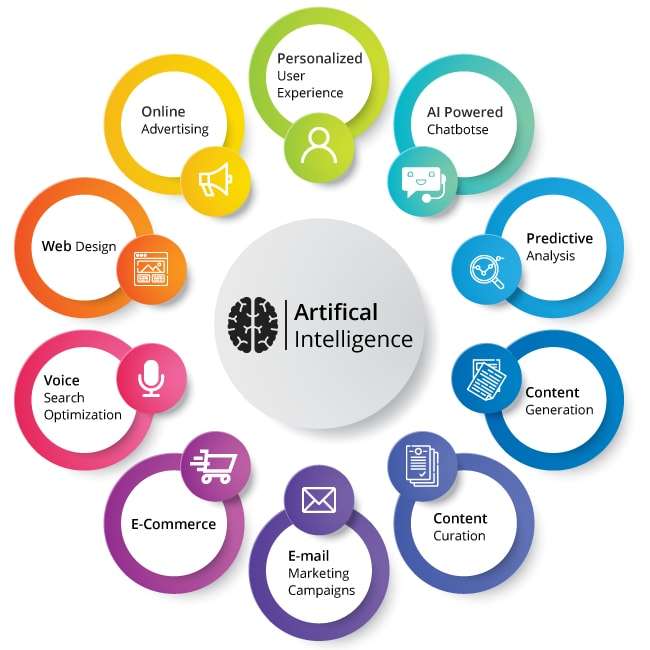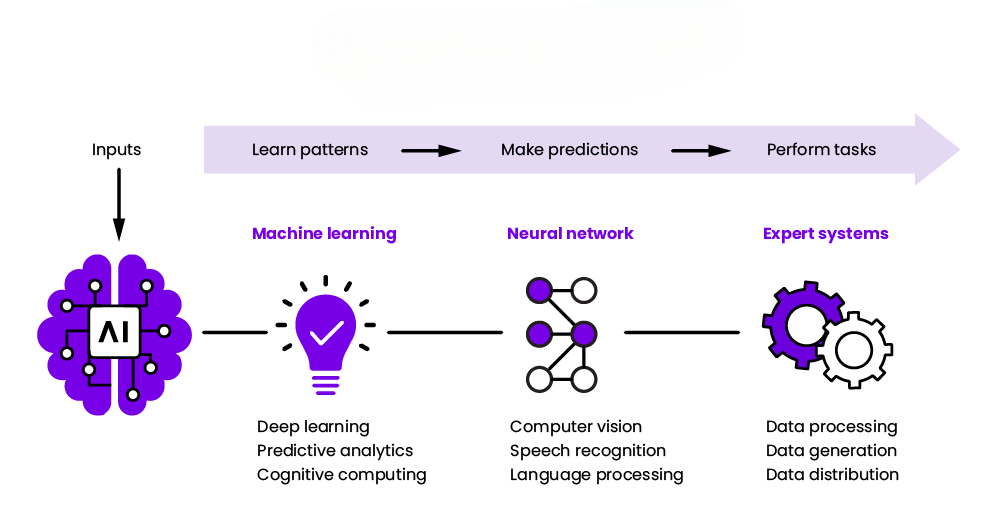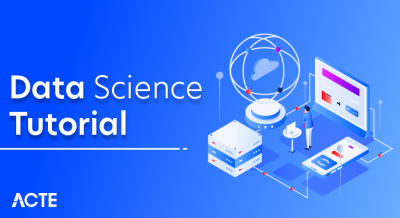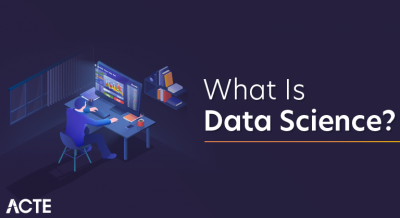
- Introduction to Expert Systems
- Components: Knowledge Base and Inference Engine
- Working of an Expert System
- Characteristics of Expert Systems
- Types of Expert Systems
- Knowledge Engineering
- Applications in Various Fields
- Advantages of Expert Systems
- Limitations and Challenges
- Examples of Expert Systems
- Conclusion
Introduction to Expert Systems
Expert Systems are a branch of artificial intelligence (AI) that simulates the decision-making abilities of a human expert in solving complex problems within a specific domain. The goal of an expert system is to mimic the expertise of a human specialist in a particular field, such as those gained through Data Science Training making it accessible to individuals who may not have the same level of expertise. These systems are designed to solve problems by reasoning through bodies of knowledge, represented mainly as rules within the system. They are widely used in various sectors, such as medicine, engineering, finance, and more, to provide assistance, recommendations, and solutions to problems. An Expert System typically consists of two main components: a knowledge base and an inference engine. These systems work by applying logical reasoning to a set of facts, ultimately deriving conclusions and solutions that are as accurate as possible. Expert Systems are seen as valuable tools for decision-making processes and have proven essential for industries where specialized knowledge is crucial, yet the availability of human experts is limited.
Would You Like to Know More About Data Science? Sign Up For Our Data Science Course Training Now!
Components: Knowledge Base and Inference Engine
Knowledge BaseThe knowledge base is the core of an expert system. It contains the domain-specific knowledge that the system uses to reason and make decisions.The knowledge base can be built by experts in a given field, and it is typically composed of facts, rules, heuristics, and sometimes procedures that represent expert knowledge concepts closely related to understanding What is Data Science and how knowledge is structured and applied. The knowledge base is constantly updated to improve the system’s effectiveness and maintain its relevance. The information it contains allows the system to infer new facts or conclusions based on existing data and rules.
Inference EngineThe inference engine is the component responsible for processing the information stored in the knowledge base. It applies the rules and logic to the knowledge base to make inferences and derive conclusions. The inference engine can operate using two primary approaches: forward chaining and backward chaining. Forward chaining starts with available data and uses inference rules to arrive at conclusions. On the other hand, backward chaining starts with a goal and works backward to find data that supports or disproves the goal.

Working of an Expert System
- User Input Initiation: The process starts when a user provides input, such as a question, problem, or a set of conditions.
- Inference Engine Activation: The inference engine evaluates the input and begins the reasoning process.
- Knowledge Base Search: The system searches its knowledge base for relevant facts, rules, and expert insights.
- Rule-Based Deduction: Logical rules are applied to the information retrieved, allowing the system to draw conclusions or make recommendations.
- Interactive Dialogue: If more data is needed, the system may ask follow-up questions to refine its analysis.
- Expert-Level Output: Finally, the expert system presents a diagnosis, solution, or suggested action based on its evaluation.
Expert Systems are a branch of artificial intelligence designed to replicate the decision-making abilities of a human expert. They use a structured approach to analyze user input, apply logical rules, and deliver expert-level solutions.
Characteristics of Expert Systems
Expert Systems possess several distinct characteristics that differentiate them from conventional software applications. These AI-based systems are designed to emulate the decision-making ability of human experts, making them valuable tools in domains requiring specialized knowledge. A fundamental trait is knowledge representation, where expert systems store and structure information using formats such as rules, semantic networks, and frames an approach often emphasized in Data Science Training This structured knowledge enables the system to perform reasoning, make deductions, and simulate expert-level thinking. Another critical component is the inference mechanism, which involves an inference engine that processes the input provided by the user, applies logical rules, and derives conclusions or actionable recommendations. User interaction is central to the system’s design, allowing users to input data and receive responses through an intuitive interface, making the experience accessible even for non-technical users. Expert systems also excel in problem-solving, particularly in complex and domain-specific scenarios, by drawing from their extensive knowledge base and using inference logic to identify solutions that might otherwise require human expertise. Many expert systems include an explanation capability, which allows them to justify their conclusions by outlining the steps taken during the reasoning process. This transparency is essential for building user confidence and trust. Finally, their adaptability makes them highly flexible, as their knowledge bases can be updated or tailored to different fields such as healthcare, engineering, finance, and agriculture, extending their usefulness across a wide range of industries and applications.
Types of Expert Systems
- Rule-Based Expert Systems: Rule-based expert systems are the most common type. They rely on sets of rules (if-then statements) to draw inferences from the knowledge base. These rules represent expert knowledge and guide the system in making decisions or solving problems. Rule-based systems are typically easy to design and implement, making them the go-to choice for many applications.
- Model-Based Expert Systems: These systems use models of the real world or specific domains to make predictions or inferences. A model-based system may simulate the behavior of a system or process and provide solutions based on that simulation. These systems are widely used in engineering, where creating and testing physical models might be impractical.
- Case-Based Expert Systems : Case-based expert systems solve problems by comparing the current situation to previous cases stored in a database. They rely on the principle of “similarity,” which means that the system finds a solution by looking at how similar problems were solved in the past an approach that can be implemented effectively using some of the Best Data Science Programming Languages
- Hybrid Expert Systems : Hybrid expert systems combine elements of rule-based, case-based, and model-based systems. By integrating different types of reasoning, hybrid systems can enhance their performance and provide more robust solutions. These systems are useful in complex decision-making tasks where different methods of reasoning are needed.
There are several types of expert systems, categorized based on their complexity, functionality, and application domains. Some of the key types include:
Knowledge Engineering
Knowledge engineering is a fundamental process in the development of expert systems, focused on building a robust and reliable knowledge base. It involves the systematic acquisition, representation, validation, and maintenance of expert-level knowledge from human specialists or credible sources. This process plays a critical role because the effectiveness and accuracy of an expert system heavily depend on the quality and structure of the knowledge it contains a concept also relevant when exploring how does TensorFlow work as both involve structured knowledge representation and inference. The first stage, knowledge acquisition, is dedicated to gathering essential information, rules, and heuristics from domain experts or trusted references. This raw knowledge is then transformed through knowledge representation, where it is organized using structured formats such as rules, semantic networks, or frames to make it usable by the expert system’s inference engine. Once represented, the knowledge must go through knowledge validation to ensure its accuracy, consistency, and applicability within the system’s decision-making framework. This step helps eliminate errors and confirms that the knowledge is relevant and reliable. Over time, as new insights and developments emerge, knowledge maintenance becomes necessary to update and refine the knowledge base, ensuring that the expert system continues to deliver timely and accurate recommendations. Together, these components make knowledge engineering a dynamic and ongoing process that ensures expert systems remain intelligent, adaptable, and effective across different domains and use cases.
Want to Pursue a Data Science Master’s Degree? Enroll For Data Science Masters Course Today!
Applications in Various Fields
- Healthcare: Expert systems are widely used in medical diagnosis and decision support. They help doctors by providing recommendations based on patient symptoms and medical history. For example, MYCIN was an early expert system developed to diagnose bacterial infections.
- Finance: In the financial sector, expert systems are used for risk assessment, fraud detection, and investment advice. These systems analyze large amounts of financial data to make recommendations and predict market trends.
- Engineering: Expert systems are used for equipment monitoring, predictive maintenance, and problem-solving in engineering and manufacturing. For example, expert systems can be employed to diagnose faults in complex machinery.
- Customer Support: In customer service, expert systems help automate troubleshooting and support processes by providing consistent, expert-level guidance based on customer queries.
- Legal: In law, expert systems can assist lawyers in finding relevant case law, analyzing legal documents, and offering legal advice.
- Knowledge Acquisition: Gathering and structuring expert knowledge is time-consuming and may not always be possible, especially when the knowledge is tacit or hard to articulate.
- Limited to Specific Domains: Expert systems are typically domain-specific and cannot generalize beyond the scope of their knowledge base.
- Complexity: As the knowledge base grows, maintaining and updating an expert system becomes increasingly complex.
- Dependence on Experts: The performance of an expert system depends heavily on the knowledge provided by human experts. If the knowledge is incomplete or inaccurate, the system’s performance will suffer.
- Lack of Common Sense: Expert systems lack human-like intuition and common sense, which means they might struggle with ambiguous or complex scenarios that require creative thinking.
Expert systems have a wide range of applications across various industries. Some notable areas include:
Advantages of Expert Systems
Expert systems offer a range of compelling advantages that make them highly valuable across various industries and applications. One of the most notable benefits is consistency, as these systems deliver reliable, repeatable decisions without the influence of human error, fatigue, or bias. This ensures that outcomes remain stable across different situations. Another key advantage is cost savings; by automating complex tasks traditionally performed by human experts, organizations can significantly reduce labor costs and increase operational efficiency benefits that are also explored when learning How to Become a Data Scientist as automation and efficiency are core goals in the field. In terms of efficiency, expert systems are capable of analyzing vast amounts of data at high speed, enabling quicker and more informed decision-making processes that would be time-consuming for humans. Availability is also a major strength unlike human experts who may have limited working hours or availability, expert systems can operate 24/7, providing uninterrupted support in time-critical environments such as healthcare, customer service, or manufacturing. Furthermore, expert systems offer scalability, meaning they can manage a growing number of users or cases without the need for proportionate increases in resources or infrastructure. This makes them highly adaptable and cost-effective solutions for organizations looking to expand their services while maintaining quality and consistency. Together, these advantages highlight why expert systems continue to be a preferred choice in modern, data-driven industries.

Limitations and Challenges
Despite their many advantages, expert systems also face limitations and challenges:
Examples of Expert Systems
Several well-known expert systems have demonstrated the practical value of this technology across different fields. MYCIN is a pioneering medical expert system designed to diagnose bacterial infections and recommend appropriate treatments, showcasing the power of expert systems in healthcare. In the field of chemistry, DENDRAL was developed to assist scientists by identifying the structure of organic compounds, helping to automate complex analytical tasks a pioneering approach that laid the groundwork for many of today’s Top Data Science Tools used in scientific analysis and automation. Another notable example is XCON (VAX Configuration Expert), created by Digital Equipment Corporation (DEC) to streamline and automate the configuration of VAX computer systems, improving efficiency in hardware setup. Additionally, CLIPS serves as a widely used rule-based expert system shell, providing a flexible environment for developers to build expert systems across various domains, from industrial applications to academic research. These examples illustrate the diverse applications and adaptability of expert systems in solving specialized problems across multiple industries.
Conclusion
Expert Systems represent a major milestone in the field of artificial intelligence, offering organizations sophisticated tools to enhance decision-making, streamline problem-solving, and automate complex tasks. These systems are designed to mimic the knowledge and reasoning abilities of human experts, enabling them to provide specialized advice, diagnose issues, and recommend solutions in a variety of domains such as medicine, engineering, finance, and customer service. By encapsulating expert knowledge in a structured format, Expert systems make it possible to apply this expertise consistently and efficiently, as often developed through Data Science Training reducing the risk of human error and bias while improving the speed and quality of decisions. Despite these significant advantages, expert systems have inherent limitations that impact their scope and effectiveness. One key challenge is their reliance on human experts during the knowledge acquisition phase, which can be time-consuming and may limit the system’s breadth of understanding. Additionally, expert systems generally lack the ability to generalize beyond their specific domain or adapt intuitively to entirely new problems, restricting their flexibility compared to human cognition. Because of these constraints, expert systems are best viewed as complementary tools designed to support and augment human intelligence rather than replace it altogether. As artificial intelligence technology continues to advance rapidly, it is anticipated that future generations of expert systems will become more powerful, incorporating learning capabilities and greater adaptability. This evolution will enable them to play an increasingly important role in driving innovation, improving operational efficiency, and solving complex challenges across a broad spectrum of industries and scientific disciplines. The integration of expert systems with other AI technologies, such as machine learning and natural language processing, promises to expand their usefulness and transform the way organizations leverage knowledge and expertise.




